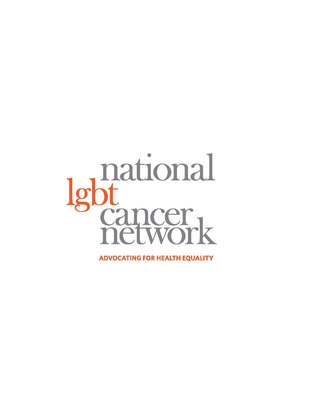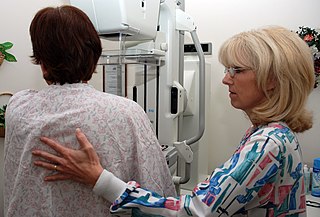
Prostate cancer is the uncontrolled growth of cells in the prostate, a gland in the male reproductive system below the bladder. Abnormal growth of prostate tissue is usually detected through screening tests, typically blood tests that check for prostate-specific antigen (PSA) levels. Those with high levels of PSA in their blood are at increased risk for developing prostate cancer. Diagnosis requires a biopsy of the prostate. If cancer is present, the pathologist assigns a Gleason score, and a higher score represents a more dangerous tumor. Medical imaging is performed to look for cancer that has spread outside the prostate. Based on the Gleason score, PSA levels, and imaging results, a cancer case is assigned a stage 1 to 4. A higher stage signifies a more advanced, more dangerous disease.

Prostate-specific antigen (PSA), also known as gamma-seminoprotein or kallikrein-3 (KLK3), P-30 antigen, is a glycoprotein enzyme encoded in humans by the KLK3 gene. PSA is a member of the kallikrein-related peptidase family and is secreted by the epithelial cells of the prostate gland in men and the paraurethral glands in women.

Movember is an annual event involving the growing of moustaches during the month of November to raise awareness of Men's Health issues, such as prostate cancer, testicular cancer, and men's suicide. It is a portmanteau of the Australian-English diminutive word for moustache, "mo", and "November". The Movember Foundation runs the Movember charity event, housed at Movember.com. The goal of Movember is to "change the face of men's health."
Prostate cancer screening is the screening process used to detect undiagnosed prostate cancer in men without signs or symptoms. When abnormal prostate tissue or cancer is found early, it may be easier to treat and cure, but it is unclear if early detection reduces mortality rates.

The National LGBT Cancer Network is a nonprofit organization launched in September 2007. It is one of the first programs in the United States that addresses the needs of lesbian, gay, bisexual and transgender (LGBTQ) cancer survivors and those at risk and the only one founded and directed by members of the LGBT community. The Network was founded by Liz Margolies, LCSW.

The objective of cancer screening is to detect cancer before symptoms appear, involving various methods such as blood tests, urine tests, DNA tests, and medical imaging. The purpose of screening is early cancer detection, to make the cancer easier to treat and extending life expectancy. In 2019, cancer was the second leading cause of death globally; more recent data is pending due to the COVID-19 pandemic.
Active surveillance is a management option for localized prostate cancer that can be offered to appropriate patients who would also be candidates for aggressive local therapies, with the intent to intervene if the disease progresses. Active surveillance should not be confused with watchful waiting, another observational strategy for men that would not be candidates for curative therapy because of a limited life expectancy.

Roger Sinclair Kirby FRCS(Urol), FEBU is a British retired prostate surgeon and professor of urology. He is prominent as a writer on men's health and prostate disease, the founding editor of the journal Prostate Cancer and Prostatic Diseases and Trends in Urology and Men's Health and a fundraiser for prostate disease charities, best known for his use of the da Vinci surgical robot for laparoscopic prostatectomy in the treatment of prostate cancer. He is a co-founder and president of the charity The Urology Foundation (TUF), vice-president of the charity Prostate Cancer UK, trustee of the King Edward VII's Hospital, and from 2020 to 2024 was president of the Royal Society of Medicine (RSM), London.
Richard J. Ablin was an American scientist, most notable for research on prostate cancer. According to the Wall Street Journal:
Richard Ablin, a professor of pathology at University of Arizona College of Medicine, discovered the prostate-specific antigen (PSA) in 1970, and for nearly as long, he has argued that it should not be used for routine screening.
Prostate Cancer Foundation of Australia is a broad-based community organisation and the peak national body for prostate cancer in Australia. The Foundation is dedicated to reducing the impact of prostate cancer on Australian men, their partners and families, recognising the diversity of the Australian community. Prostate Cancer Foundation of Australia receives Government funding for specific projects and relies on the generosity of individuals, the community and partnerships to carry out its work.
Overscreening, also called unnecessary screening, is the performance of medical screening without a medical indication to do so. Screening is a medical test in a healthy person who is showing no symptoms of a disease and is intended to detect a disease so that a person may prepare to respond to it. Screening is indicated in people who have some threshold risk for getting a disease, but is not indicated in people who are unlikely to develop a disease. Overscreening is a type of unnecessary health care.
Rosetta Martiniello-Wilks is an Australian cancer researcher. She is a former senior lecturer at the University of Technology Sydney (UTS) in Ultimo, Sydney, Australia. Martiniello-Wilks was a core member of the Centre for Health Technologies at UTS and head of the Translational Cancer Research Group in the School of Medical and Molecular Biosciences, Faculty of Science, UTS.
Judith Ann Clements is an Australian academic and educator, specializing in Kallikrein proteases in prostate and ovarian cancers. Clements is the scientific director at the Australian Prostate Cancer Research Centre – Queensland and was head of the Cancer Research Program at the Institute of Health and Biomedical Innovation (IHBI) of Queensland University of Technology at the Translational Research Institute (Australia) from 1997–2014. Her biography was published in the Cancer and Metastasis Reviews in 2019
Founded in 1965, the foundation's key role is to support the leading medical and health research conducted at The Queen Elizabeth Hospital and the Basil Hetzel Institute for Translational Health Research to improve the health of the South Australian community.
Andrew Julian Vickers is a biostatistician and attending research methodologist at Memorial Sloan Kettering Cancer Center. Since 2013, he has also been professor of public health at Weill Cornell Medical College. He is the statistical editor for the peer-reviewed journal European Urology.
Suzanne Kathleen Chambers, is a Professor and Dean of the Faculty of Health at Sydney's University of Technology. She specialises in psycho-oncology, and has received Queen's Birthday honours. Chambers has worked on psycho-oncology, prostate cancer, health economics and psychological interventions including the distress and adjustments after cancer.
Declan G. Murphy, FRACS, FRCS, is a urologist, director of the unit for genitourinary oncology and robotic surgery at the Peter MacCallum Cancer Centre in Melbourne, Australia, professor at the Sir Peter MacCallum Department of Oncology at the University of Melbourne, and associate editor of the British Journal of Urology International. In 2010 he introduced robotic surgery for urology to the public sector health services in Victoria, Australia.
Anthony James Costello, FRACS, FRCSI, is an Australian urologist. He served as head of the department of urology at the Royal Melbourne Hospital, Australia. He established the first robotic prostate cancer surgery programme in Australia and published the first series of men who had laser surgery for benign prostate enlargements.
Alan Wayne Partin was an American prostate surgeon and researcher. He was the Jakurski Family Director of the Brady Urological Institute, Urologist-In-Chief of Johns Hopkins School of Medicine, and professor of urology, Pathology, and Oncology. In 1993, he developed the PartinTables to help prostate cancer patients get an accurate prediction of their likelihood of being cured.
Raymond Javan Chan is an Australian oncology nurse, clinical trialist, researcher, and senior administrator. He is Matthew Flinders Professor of Cancer Nursing, and Director of the Caring Futures Institute and Dean of Research within the College of Nursing and Health Sciences, Flinders University. He also holds academic titles as NHMRC Investigator Fellow and Matthew Flinders Fellow. He also currently holds an NHMRC Investigator Fellowship.






